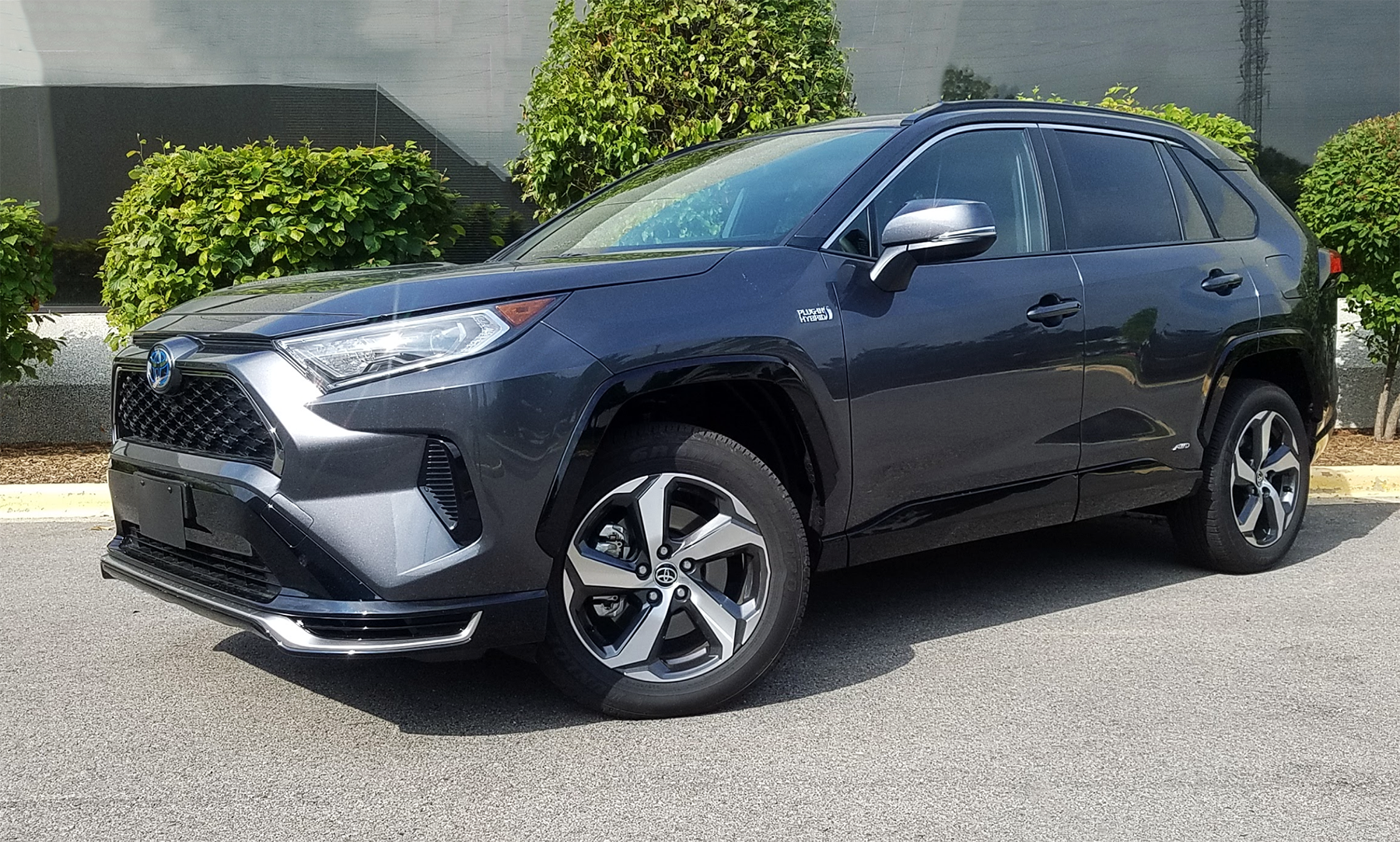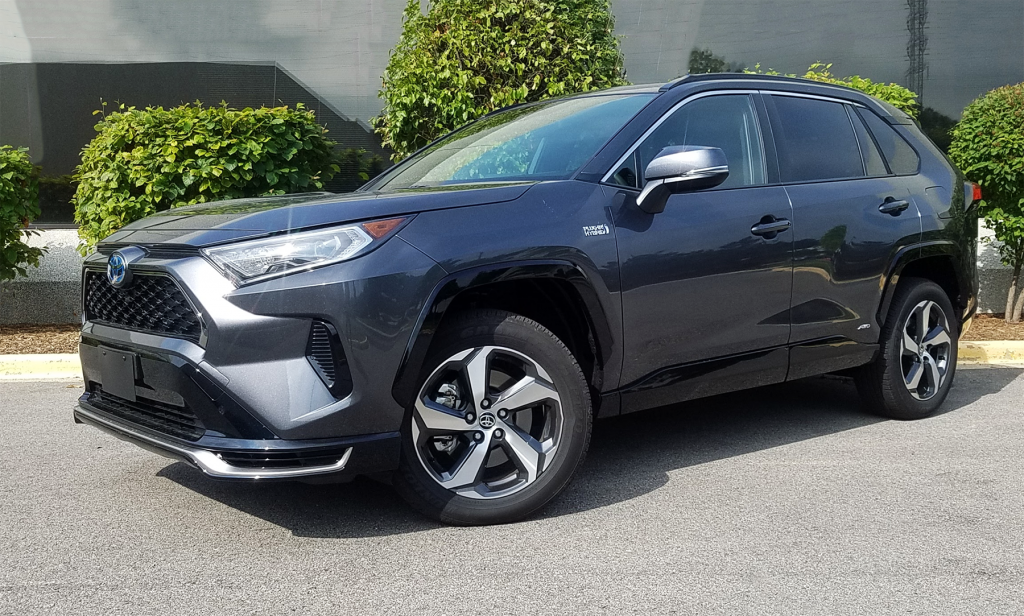
Class: Compact Crossover
Miles driven: 167
Fuel used: 2.0 gallons
| CG Report Card | |
|---|---|
| Room and Comfort | B+ |
| Power and Performance | B+ |
| Fit and Finish | C+ |
| Fuel Economy | A+ |
| Value | A- |
| Report-card grades are derived from a consensus of test-driver evaluations. All grades are versus other vehicles in the same class. Value grade is for specific trim level evaluated, and may not reflect Consumer Guide's impressions of the entire model lineup. | |
| Big & Tall Comfort | |
| Big Guy | B- |
| Tall Guy | B- |
| Big & Tall comfort ratings are for front seats only. "Big" rating based on male tester weighing approximately 350 pounds, "Tall" rating based on 6'6"-tall male tester. | |
| Drivetrain | |
| Engine Specs | 302-hp 2.5L |
| Engine Type | 4-cyl/electric |
| Transmission | CVT |
| Drive Wheels | AWD |
Real-world fuel economy: 83.5 mpg
Driving mix: 60% city, 40% highway
EPA-estimated fuel economy: 94 MPGe/38 mpg (city/highway combined)
Fuel type: Regular gas
Base price: $38,100 (not including $1175 destination charge)
Options on test vehicle: SE Prime Weather and Moonroof Package ($1665), carpeted floor mats ($169)
Price as tested: $41,109
More Toyota price and availability information
Quick Hits
The great: Snappy acceleration, outstanding fuel economy, high-tech features, fuel-saving flexibility of plug-in-hybrid powertrain
The good: Control layout, decent road manners, cargo capacity
The not so good: Mediocre front-seat space for larger folks, some so-so interior materials
John Biel:
From Toyota’s perspective, the RAV4 compact SUV already is a “green” vehicle—as in long green. It far and away is the brand’s best-selling vehicle line (2019 U.S. sales of 448,071, a good 111,000 more than runner-up Camry per Automotive News). Now Toyota makes its little money-maker greener for 2021 with a new Prime plug-in-hybrid version.
This deeper shade of the color is the environmental kind. The RAV4 Prime has an EPA-estimated 94 MPGe fuel-economy rating and 42-mile range of all-electric operation. And there’s even a streak of green flag running through the Prime’s metaphorical color palette. At 302 system horsepower, it is the most powerful and quickest RAV4 ever with, Toyota says, the ability to hit 60 mph from a standstill in 5.7 seconds. In fact, Toyota is marketing the Prime as being as much of an upscale performance vehicle as one that’s “clean.”
Test Drive: 2020 Honda CR-V Hybrid Touring
Under the Prime’s hood resides a uniquely tuned version of the conventional RAV4 Hybrid’s 2.5-liter 4-cylinder gas engine, paired with more-powerful electric motors. (The plug-in powerteam makes an additional 83 horsepower.) Power gets to the standard electronic on-demand all-wheel driveline via an electronically controlled continuously variable transmission with sequential shift mode. Drivers can select “Normal,” “Sport,” “ECO,” “Trail,” automatic EV/HV, or HV/EV charge-hold modes. The Prime power unit is nicely responsive running as an EV or conventional hybrid. However, as in a current-generation gas RAV4 that Consumer Guide has tested, Sport’s effect on driving behavior is hard to detect. Towing capacity is set at 2500 pounds.
Test Drive: 2021 Toyota Venza XLE
Here’s one man’s experience with RAV4 Prime operation: I started with a full charge and 46 indicated miles of EV range. It was a hot late-summer day, but even with air conditioning on, only six indicated miles came off during an approximately 30-mile trip home—a little more than 50 percent of which was in expressway-type driving. Full EV capacity finally zeroed out the next day with the trip odometer at 68.5 miles, during a run dominated by freely moving Interstate traffic. Thanks to the assists of all-electric and conventional hybrid power, when I topped off at the end of my 167-mile test stint—40 percent in highway-style driving—gas mileage worked out to 83.5 mpg. (By the way, EPA fuel-economy estimates for conventional hybrid operation are 40 mpg in the city, 36 mpg on the highway, and 38 combined.)
The Prime comes with a power cord for home charging from 120- or 240-volt outlets. Toyota says that it should take 12 hours to attain a full charge at 120 volts, or as little as 2.5 hours using a 240-volt outlet.
Test Drive: 2020 Ford Escape Hybrid
Primes are available in two trim levels, SE and plusher XSE. CG tested the SE, which starts at $39,275 with delivery. A sport-tuned suspension and a unique front grille and front spoiler are standard for both. So is Toyota’s Safety Sense 2.0 suite of active safety equipment that consists of forward-collision warning with automatic emergency braking, adaptive cruise control, automatic high-beam headlights, and lane-departure warning with lane-keep assist. SEs have a power liftgate; 18-inch alloy wheels; low-profile black roof rails; LED exterior lighting; color-keyed heated power exterior mirrors with turn-signal and blind-spot-warning indicators; heated cloth front seats; dual-zone automatic climate control; keyless entry and starting; remote keyless entry; and an 8-inch touchscreen audio system with Amazon Alexa, Apple CarPlay, and Android Auto capability.
Test Drive: 2019 Toyota RAV4 Hybrid Limited
Ride from the specifically tuned suspension is firm but not harsh. Steering is responsive, and cornering lean is managed pretty well for a crossover SUV. Passengers enjoy a quiet cabin save for a number of odd but harmless little system sounds that pipe up at various times. Under regenerative braking there’s a better sense that the vehicle is stopping in relation to pedal effort, with less of that “hey, are these things working?” sensation so common to earlier hybrids.
Compressible, soft surfaces are confined to the upper dash, door armrests, and console-box lid/armrest. Drivers do grip a leather-wrapped steering wheel and shifter knob. Elsewhere, though, there is lots of pretty mundane hard plastic. Red contrast stitching adds a touch of color on seats and other surfaces.
Driving controls include a digital speedometer and 7-inch vehicle-information display with, among other things, hybrid-system function monitoring. Audio presets are easy to program on the touchscreen (physical tuning knobs are a help), and climate controls have handy rotary knobs to set temperatures but repetitive-push buttons to select fan speed and mode.
Space for passengers and cargo is on par with that of any other RAV4. Headroom seems better in the second row than in front, but pleasing levels of legroom are available in both. A minimal floor hump improves the chances of getting three people—perhaps even a trio trim-of-build adults—in the rear seat. Personal-item storage falls to a good-sized glove box, a tray across the dash, small console box, short pockets in the front doors, and a storage pouch on the back of the front passenger seat. Exposed cup holders are in the console and pull-down rear armrest; all doors incorporate bottle holders. Cargo space on the flat load floor is good. The 60/40-split rear seats fold almost flat to greatly expand capacity. With rear seats down, the car had plenty of room for a repaired window screen that was more than five feet long.
The ’21 RAV4 Prime comes in six solid colors and five 2-tones. Not one of them is a green. Maybe Toyota felt that would be too on the nose.
Test Drive: 2019 Mitsubishi Outlander PHEV
Click below for enlarged images
Listen to the very entertaining Consumer Guide Car Stuff Podcast
2021 Toyota RAV4 Prime SE Gallery
